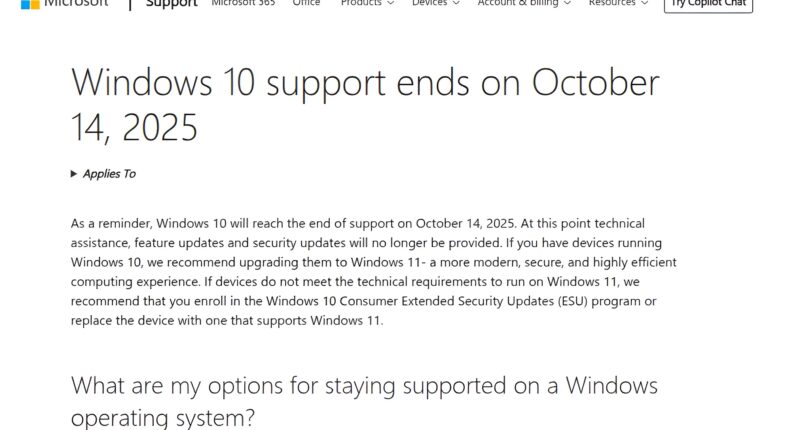Microsoft has ended free security updates for Windows 10 after a decade of support, leaving millions of users vulnerable to cyber attacks as 40 per cent of active Windows PCs worldwide continue running the outdated operating system.
As of last month, 25 per cent of active Windows PCs in the workplace were still running Windows 10, according to market researcher IDC, reports Bloomberg. Data from Counterpoint Research and German digital workplace provider TeamViewer, which includes consumer users, puts the figure at 40 per cent.
From today, technical assistance, feature updates and security updates will no longer be provided for Windows 10, which was released in 2015. Microsoft recommends users upgrade to Windows 11 or enrol in the Extended Security Updates programme, which can protect Windows 10 devices up to a year after today’s deadline.
Dustin Childs, who heads up cyber threat awareness at Trend Micro and previously worked at Microsoft, warned that the scenario mirrors the end of Windows XP support but on a far larger scale with more sophisticated attackers. He says: “I used to work at Microsoft and I was there when support for Windows XP ended, and you know everyone thought the world was going to end and it didn’t. But what we did see was the exploitation of Windows XP ratcheted up quite a bit after support ended.”
Childs added: “You may think of yourself as unimportant, but that is one more drop in a tidal wave that could be used in a botnet. I definitely think we will see attacks specific to Windows 10 within the first half of 2026.”
Microsoft announced the end-of-support timeline years in advance, stating security is its top priority. However, the company’s Windows 11 has raised minimum hardware specifications, leaving many still-capable computers ineligible for the upgrade. Users can check eligibility through Settings, Update & Security, Windows Update and selecting Check for updates.
Nathan Proctor, director of the Campaign for the Right to Repair at Public Interest Research Group, warned that following Microsoft’s advice fully would require millions to discard their functioning Windows 10 PCs, creating an unprecedented mountain of e-waste. Proctor considers Windows 10 “a much better product” than Windows 11.
Windows 11 was released four years ago, but many users have found no compelling reason to upgrade from Windows 10, which was designed from the outset as constantly evolving software. Microsoft offers three options for users: installing Windows 11 if their PC meets minimum requirements, purchasing a new PC with Windows 11 pre-installed, or enrolling in the paid Extended Security Updates programme.











